Basic Policy on Social Contribution Activities
As a company that helps people lead healthier, happier lives, Nippon Shinyaku will seek to secure growth in harmony with the environment by engaging in business activities that are friendly to the global environment and pursuing initiatives that conserve, maintain, and improve the environment.
Priority areas in social contribution activities
- Contribution to the development of healthcare and welfare
- Activities for fostering the next generation
- Contribution to the Development of Local Communities
Related Initiatives
Contributing to the future of children
The Nippon Shinyaku Children's Literary Awards
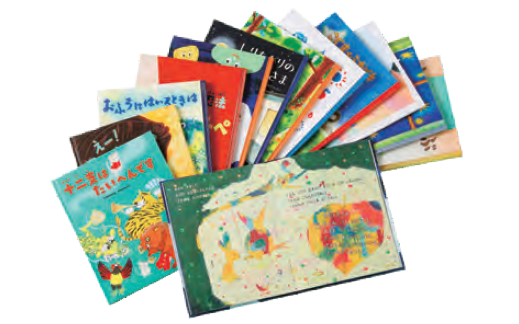 The Nippon Shinyaku Children's Literary Awards were initiated in 2009, the 90th anniversary of the company’s founding, with the aim of bringing every child dreams and hopes through picture books and helping them grow healthily. With the support of the Japan Juvenile Writers Association, we call for entries in the two categories of stories and artworks every year. The entries selected for the first prize in each category are used to produce picture books. Copies of the completed picture books are presented to children nationwide through children’s hospitals and other medical institutions, as well as public facilities. The picture books are also posted on the award’s website.
The Nippon Shinyaku Children's Literary Awards were initiated in 2009, the 90th anniversary of the company’s founding, with the aim of bringing every child dreams and hopes through picture books and helping them grow healthily. With the support of the Japan Juvenile Writers Association, we call for entries in the two categories of stories and artworks every year. The entries selected for the first prize in each category are used to produce picture books. Copies of the completed picture books are presented to children nationwide through children’s hospitals and other medical institutions, as well as public facilities. The picture books are also posted on the award’s website.
Nippon Shinyaku Kids Channel for Brilliant Future
In October 2020, Nippon Shinyaku opened a YouTube channel, “Nippon Shinyaku Kira Kira Mirai Kodomo Channel (Nippon Shinyaku Kids Channel for Brilliant Future)” to show videos illustrating and narrating the 12 stories produced as part of the Nippon Shinyaku Children’s Literary Awards.
We hope that, as outdoor and other daily activities are largely restricted due to the COVID-19 pandemic, many children will enjoy the videos and nurture their hopes and dreams for a brighter future.
Nippon Shinyaku Sparkling Future Mobile Library
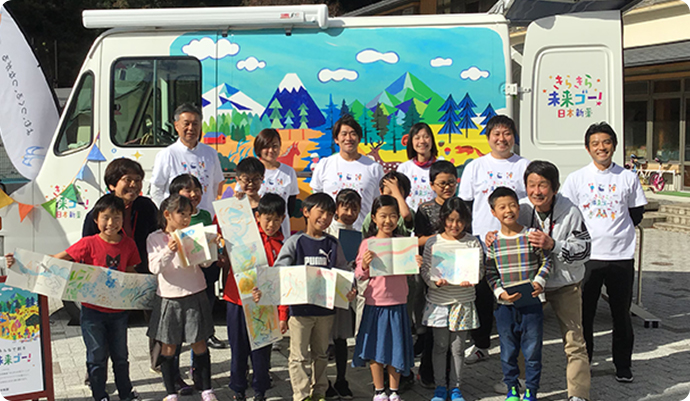 As part of the project to celebrate the centenary of its founding, in 2019, Nippon Shinyaku launched the Nippon Shinyaku Sparkling Future Mobile Library initiative to offer exciting reading experiences to children. Loaded with about 1,000 printed books and digital books, including picture books produced as the fruits of the Nippon Shinyaku Children’s Literary Award, illustrated encyclopedias, and accessible books (Braille and audio picture books), the bookmobile visits elementary schools and special needs schools together with volunteers from Nippon Shinyaku.
As part of the project to celebrate the centenary of its founding, in 2019, Nippon Shinyaku launched the Nippon Shinyaku Sparkling Future Mobile Library initiative to offer exciting reading experiences to children. Loaded with about 1,000 printed books and digital books, including picture books produced as the fruits of the Nippon Shinyaku Children’s Literary Award, illustrated encyclopedias, and accessible books (Braille and audio picture books), the bookmobile visits elementary schools and special needs schools together with volunteers from Nippon Shinyaku.
We will continue to contribute to enhancing the mental health of children, in addition to their physical health, by providing them with opportunities to enjoy various books.
Nippon Shinyaku & Seitaro Kuroda
Smiles Art Project
For 11 years from March 2013 to August 2024, Nippon Shinyaku conducted the "Nippon Shinyaku & Seitaro Kuroda Smiles Art Project,” a nationwide traveling art project that traveled across Japan and invited local people to draw pictures together on the walls of hospitals and nursing homes. Led by the renowned illustrator Seitaro Kuroda, a group of people visited their local hospitals and nursing homes and drew pictures together on the walls of those facilities. Doctors and other healthcare professionals, patients, elderly persons, children, students, and many others drew pictures together. This project aimed to deepen ties among people in local communities and bring smiles to their faces by drawing pictures together.
Community Service through Sports
Working with municipal governments and baseball associations, for many years the Nippon Shinyaku baseball team has organized baseball clinics for players of various ages, including elementary, junior high, and high school students. In recent years, the Company has been holding sports clinics for preschool children in the vicinity of Kyoto to experience the joy of exercise. In November 2022, Nippon Shinyaku visited Kyoto Seibo Gakuin Nursery School in Fushimi Ward, Kyoto, and conducted sports clinics, including tee-ball classes. At the Nippon Shinyaku Children’s Challenge Cup, held at Wakasa Stadium Kyoto in December 2022, the Company conducted athletic performance measurements—something most preschool children never get to experience—nutrition education activities, and other activities.
In addition, besides our hardball baseball activities, we organized e-sports contests accessible online and on site for children with disabilities with the use of an eye-tracking application in August 2022. Going forward, we will carry on with these initiatives and contribute to the development of local communities through social contribution activities.
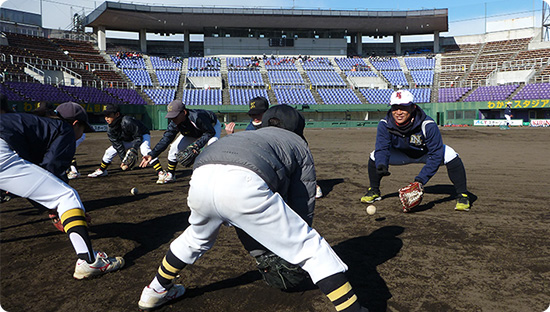
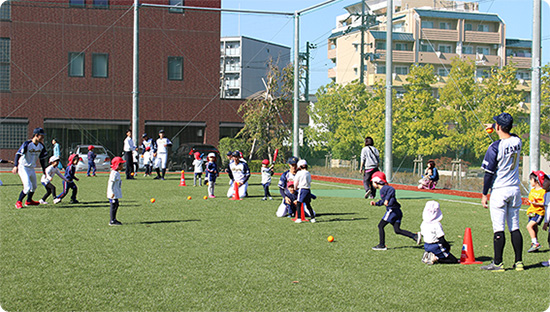
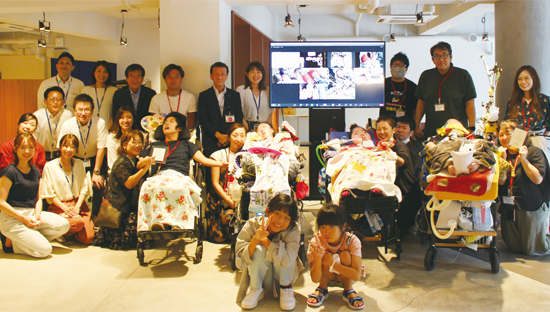
Conducting dietary education activities for children
In the fall of 2021, we began developing food education activities as part of our efforts to establish a new materiality.
In recent years, the trend toward nuclear families, simplification of meals, “individual eating,” (family members of the same household eating meals separately), and “solitary eating,” (eating alone) have led to an unbalanced nutritional intake and an increasing number of people who do not have the habit of eating breakfast. The problem of not eating breakfast is particularly serious among the current generation of children. This does not only affect children, but also the elderly, who suffer serious consequences of low nutrition such as frailty*1 and sarcopenia*2. To address these serious challenges among the younger and older generations, we are working with local governments, educational institutions, and other organizations to develop activities for food education and to develop products that will foster interest in food and healthy eating habits. As a first step, we registered as a “Kyoto Food Education Support Company” in March 2022. As a business, we will actively support and cooperate with the “Kyoto Food Education Network” organized by Kyoto Prefecture to promote food education activities through the collaboration of various parties involved in food education, including local governments, schools, experts, and media organizations. The main objectives of Kyoto Prefecture's food education activities for children are the establishment of regular eating habits, wellbalanced nutrition, and teaching the traditions of local specialties and food culture. Nippon Shinyaku supports these activities by providing on-site classes, producing and supplying booklets, and assisting with the hosting of events. We are also working to develop consumer products that contribute to food education.
*1 Frailty: A condition in which the body's ability to maintain a healthy body and to cope with stress deteriorates.
*2 Sarcopenia (muscle atrophy): A condition in which overall body functions deteriorate due to loss of muscle mass and strength.
In the fall of 2021, we began developing food education activities as part of our efforts to establish a new materiality.
In recent years, the trend toward nuclear families, simplification of meals, “individual eating,” (family members of the same household eating meals separately), and “solitary eating,” (eating alone) have led to an unbalanced nutritional intake and an increasing number of people who do not have the habit of eating breakfast. The problem of not eating breakfast is particularly serious among the current generation of children. This does not only affect children, but also the elderly, who suffer serious consequences of low nutrition such as frailty*1 and sarcopenia*2. To address these serious challenges among the younger and older generations, we are working with local governments, educational institutions, and other organizations to develop activities for food education and to develop products that will foster interest in food and healthy eating habits. As a first step, we registered as a “Kyoto Food Education Support Company” in March 2022. As a business, we will actively support and cooperate with the “Kyoto Food Education Network” organized by Kyoto Prefecture to promote food education activities through the collaboration of various parties involved in food education, including local governments, schools, experts, and media organizations. The main objectives of Kyoto Prefecture's
food education activities for children are the establishment of regular eating habits, wellbalanced nutrition, and teaching the traditions of local specialties and food culture. Nippon Shinyaku supports these activities by providing on-site classes, producing and supplying booklets, and assisting with the hosting of events. We are also working to develop consumer products that contribute to food education.
*1 Frailty: A condition in which the body's ability to maintain a healthy body and to cope with stress deteriorates.
*2 Sarcopenia (muscle atrophy): A condition in which overall body functions deteriorate due to loss of muscle mass and strength.
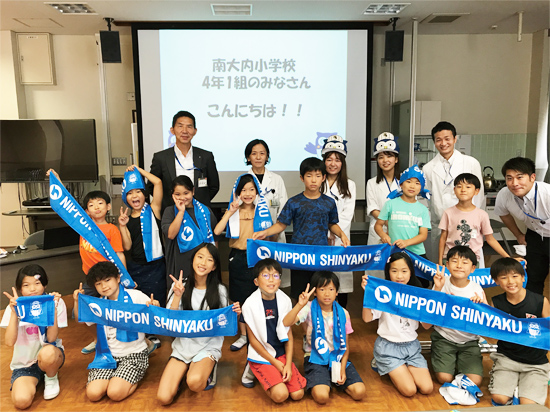
Activities implemented by the Odawara Central Factory
The Odawara Central Factory is actively engaged in activities that contribute to the development and growth of children, who will lead the future.
Donation of 300 pairs of work shoes to Kanagawa Prefectural Odawara School for Special Needs Education
The Factory donated 300 pairs of shoes, generated when employees’ work shoes were replaced as part of its safety and health promotion activities, to the Kanagawa Prefectural Odawara School for Special Needs Education, with which it has been collaborating on a regular basis in the employment of people with disabilities.
The donated work shoes were not only worn by the students but were also used in art classes to create original design shoes.
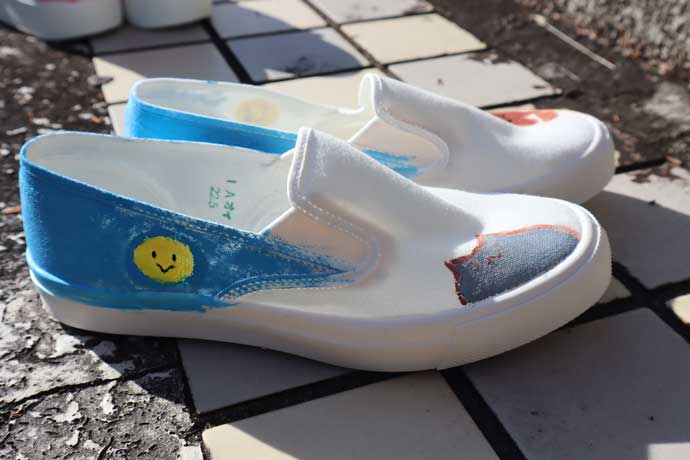
Acorn gathering event
The Factory holds an acorn gathering event every year for nearby kindergarten children, making use of the Lithocarpus edulis trees growing on its premises. Children take collected acorns home and create wall decorations and other things. This annual event provides an opportunity for children not only to contact with nature and create precious memories but also to develop rich sensibilities and creativity.
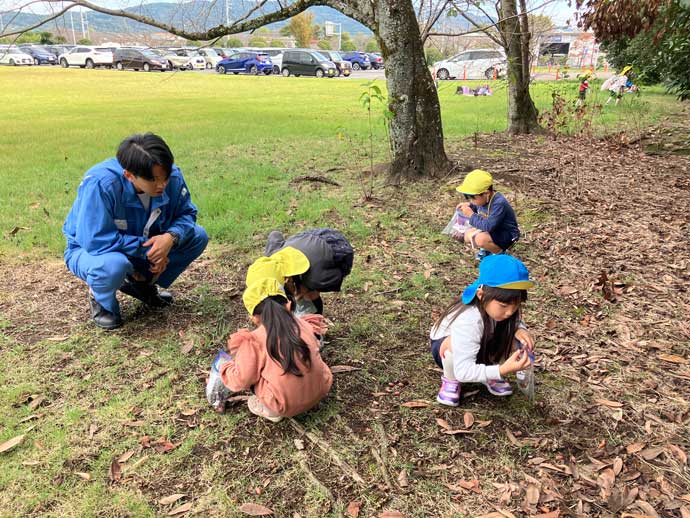
Baseball classes and ground lending
The Factory regularly invites local junior baseball teams to the baseball ground within its premise and holds baseball classes taught by Nippon Shinyaku baseball team members. The Factory also lends its baseball ground as a practice field for junior baseball teams, thereby supporting the healthy growth of children and the promotion of sports.
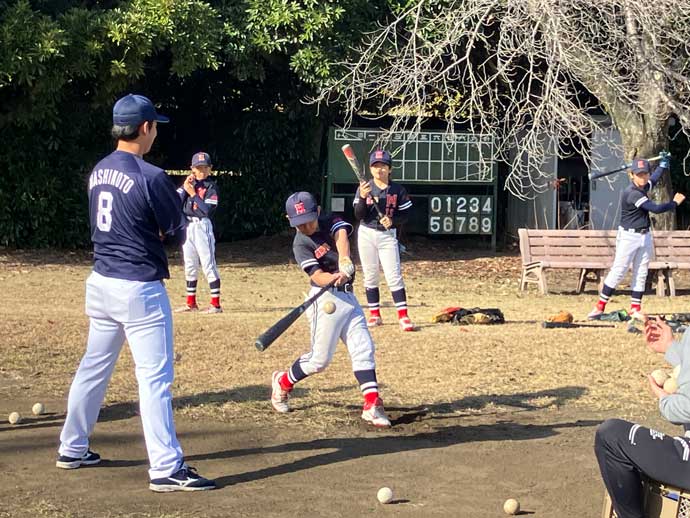
Provision of diverse learning opportunities
The Factory provides work experience opportunities for students at support schools for children with disabilities. This activity aims to help them learn the meaning and joy of working and motivate them to participate in society. Additionally, the Factory lends its cafeteria to junior college students aiming to become nutritionists to allow them to gain practical experience in operating a cafeteria.
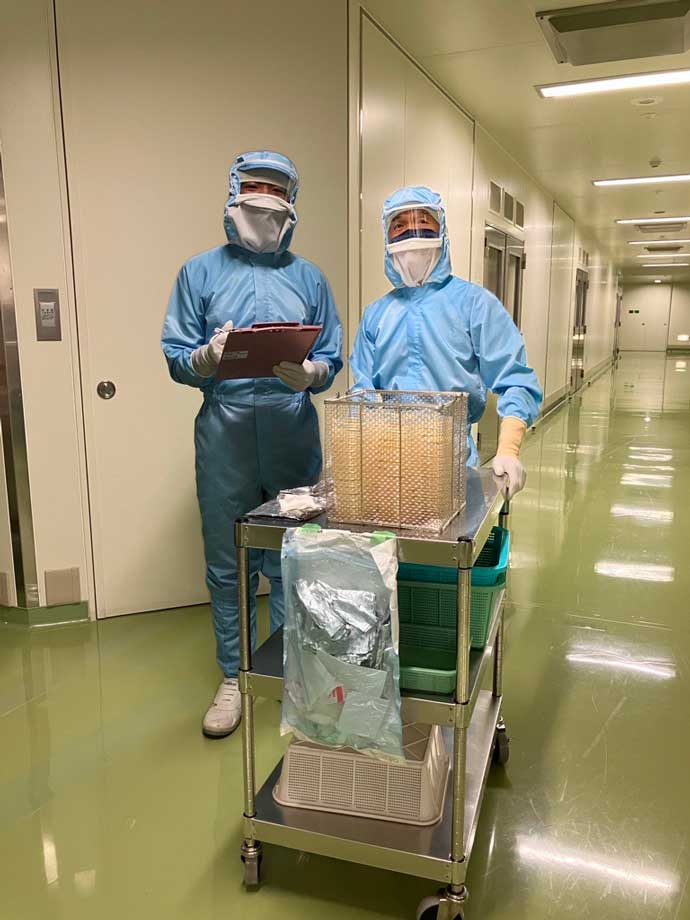
Contribution to regions and cultures
Contribution to the local community
Participation in the Sakawa River cleanup project “Clean Sakawa”
Since 1991, as one of the citizen-led beautification campaigns, the Odawara City General Federation of Neighborhood Associations has been conducting the “Clean Sakawa” project to clean up the Sakawa River, one of Odawara’s representative rivers, with the support of Odawara City and in cooperation with volunteer groups, citizens, and companies. Our employees and their families have participated in the “Clean Sakawa” project every year since its inception.
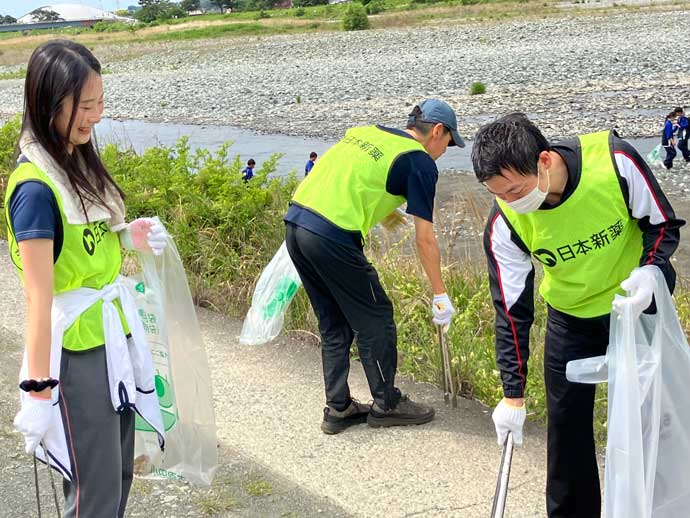
Contribution to Kyoto culture
Colored stencil calendar
Every year for more than half a century, Nippon Shinyaku has created a calendar featuring colored pictures made with a traditional stencil-dyeing technique originating in Kyoto. These beautiful colored stencil pictures represent Kyoto’s seasonal landscapes and staples, historic events, etc.
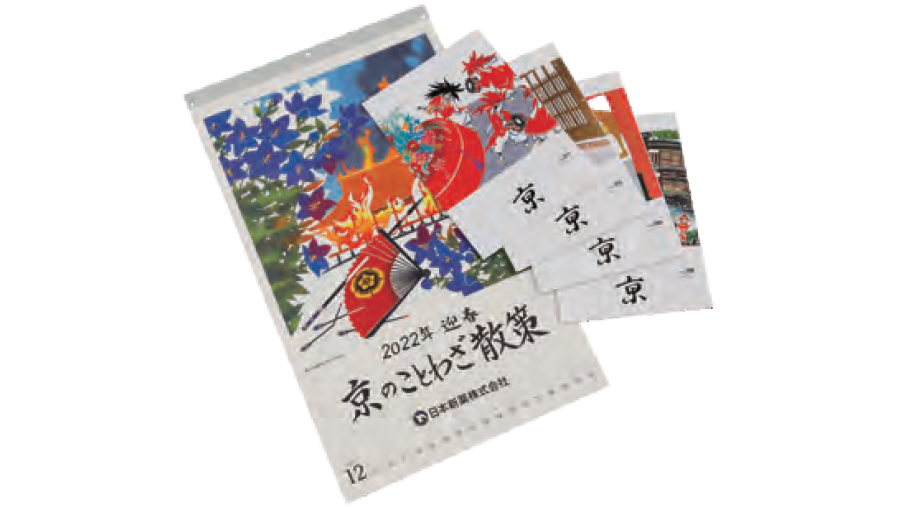
Publication of the PR magazine Kyo
We publish a quarterly PR magazine titled Kyo to showcase the huge appeal of Kyoto from a wide variety of perspectives—from the city’s many shrines, temples, and other cultural assets to its cuisine and local specialties.
Cultivation and dedication of futaba aoi (Asarum caulescens) for the Aoi Festival at Kamigamo-jinja Shrine, Kyoto Prefecture
In collaboration with the Afuhi Project, a general incorporated foundation, Nippon Shinyaku cultivates and dedicates futaba aoi (Asarum caulescens), which is used in the Aoi Festival held in Kyoto every May.
Participation in a Kyoto City Board of Education project
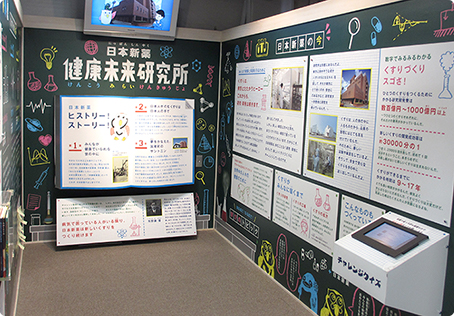 Kyoto Manabi-no-machi Ikikata Tankyu-kan (Learning City Kyoto’s Life Path Exploration Hall) is a project launched by the Board of Education of Kyoto City to offer various forms of participatory learning to promote education in life path exploration. One program within the framework of this project is Kyoto Monozukuri-no Dendo/Kobo Gakushu (Kyoto Manufacturing Hall of Fame and Learning in Workshops). This program is composed of two parts: an exhibition facility (Hall of Fame), which displays and introduces the lives and works of Kyoto-based manufacturing company founders, scientists, and other personalities, and Monozukuri Daiichi Kobo (First Manufacturing Studio), where workshops are held for participants to experience and learn about manufacturing on themes related to the exhibits at the Hall of Fame.
Kyoto Manabi-no-machi Ikikata Tankyu-kan (Learning City Kyoto’s Life Path Exploration Hall) is a project launched by the Board of Education of Kyoto City to offer various forms of participatory learning to promote education in life path exploration. One program within the framework of this project is Kyoto Monozukuri-no Dendo/Kobo Gakushu (Kyoto Manufacturing Hall of Fame and Learning in Workshops). This program is composed of two parts: an exhibition facility (Hall of Fame), which displays and introduces the lives and works of Kyoto-based manufacturing company founders, scientists, and other personalities, and Monozukuri Daiichi Kobo (First Manufacturing Studio), where workshops are held for participants to experience and learn about manufacturing on themes related to the exhibits at the Hall of Fame.
As a Kyoto-based company possessing technologies and products closely related to people’s daily life, Nippon Shinyaku has a permanent exhibition booth at the Hall of Fame and Learning in Workshops. The booth is mainly visited by elementary school pupils from Kyoto City.
Activities at the Yamashina Botanical Research Institute
To contribute to educational activities, the Yamashina Botanical Research Institute organizes study tours and observation events focusing on useful or rare plants intended for researchers and students. The gardens at the institute are periodically open to the public as part of the Group’s active commitment to communicating with the local communities.
| Total number of visitors | Visitors from universities (including instructors) |
Botanists and medical professionals |
General visitors | |
|---|---|---|---|---|
| FY2019 | 1,645 people | 67 people | 225 people | 1,353 people |
| FY2020 | 327 people | 8 people | 53 people | 226 people |
| FY2021 | 745 people | 228 people | 44 people | 473 people |
| FY2022 | 1,335 people | 103 people | 240 people | 992 people |
| FY2023 | 1,651 people | 109 people | 296 people | 1,246 people |
| FY2024 | 2,230 people | 365 people | 295 people | 1,570 people |









